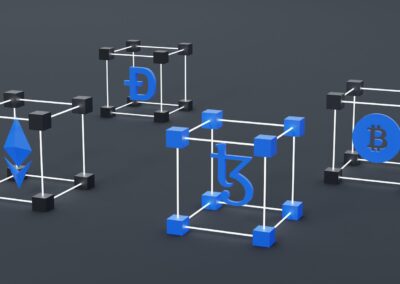How Decentralized Identity Will Transform Credential Verification
The future of decentralized identity is set to revolutionize how we manage and verify credentials, leveraging the power of blockchain technology. This transformation is particularly significant in dynamic regions such as Saudi Arabia and the UAE, where innovation and modernization are at the forefront of national agendas. The shift towards decentralized identity systems promises to enhance the security, accessibility, and authenticity of digital diplomas and professional certifications, fostering a more trustworthy and efficient verification process.
Embracing Blockchain for Enhanced Security
Blockchain technology offers a robust solution for the secure management of digital credentials. In Saudi Arabia and the UAE, where technological advancement is rapidly accelerating, blockchain’s decentralized nature ensures that data is immutable and tamper-proof. This means that once a digital diploma or professional certification is recorded on the blockchain, it cannot be altered or deleted without detection. For business executives and mid-level managers, this level of security is crucial in maintaining the integrity of their workforce’s credentials. Moreover, blockchain can prevent fraudulent activities by providing a transparent and verifiable record of qualifications, significantly reducing the risk of forgery.
Streamlining Verification Processes
Incorporating blockchain into credential verification processes can significantly streamline operations for businesses and educational institutions. Traditional methods of verifying diplomas and certifications often involve lengthy procedures and multiple intermediaries. With decentralized identity systems, the verification process becomes almost instantaneous. For example, an employer in Riyadh or Dubai can verify a candidate’s qualifications in real-time without the need for third-party verification services. This not only speeds up hiring processes but also reduces administrative overhead, allowing organizations to focus more on strategic initiatives rather than operational bottlenecks.
Fostering Trust and Authenticity
Trust and authenticity are critical components of successful business operations. By adopting decentralized identity systems, companies can ensure that all credentials are authentic and issued by recognized entities. This is particularly important in regions like Saudi Arabia and the UAE, where the labor market is highly competitive, and the influx of expatriate talent necessitates stringent verification processes. Blockchain technology enables a high degree of transparency, allowing stakeholders to verify the origin and authenticity of digital credentials easily. This fosters greater trust among employers, employees, and educational institutions, ultimately contributing to a more reliable and efficient job market.
The Role of Artificial Intelligence in Decentralized Identity
Artificial Intelligence (AI) can further enhance decentralized identity systems by providing advanced analytics and automated verification processes. In Saudi Arabia and the UAE, where AI integration is a national priority, combining AI with blockchain can create a powerful tool for managing digital credentials. AI algorithms can quickly analyze and verify the authenticity of credentials, flagging any anomalies or inconsistencies. For business executives, this means a more efficient and reliable hiring process, as AI can handle large volumes of data with greater accuracy and speed than traditional methods. Additionally, AI can provide insights into the patterns and trends in credential issuance and verification, helping organizations make informed decisions about talent acquisition and development.
Implications for Change Management and Executive Coaching
The adoption of decentralized identity systems will necessitate significant change management efforts within organizations. Business leaders in Riyadh and Dubai must be prepared to guide their teams through this transition, ensuring that employees understand the benefits and functionalities of these new systems. Executive coaching services can play a crucial role in this process, providing leaders with the skills and knowledge needed to effectively manage change and communicate the strategic advantages of decentralized identity. By fostering a culture of innovation and adaptability, organizations can successfully integrate these advanced technologies into their operations, driving business success and maintaining a competitive edge.
Conclusion: A Future of Secure and Efficient Credential Management
In conclusion, the future of decentralized identity holds immense potential for transforming how we manage and verify digital credentials. By leveraging blockchain technology and integrating AI, regions like Saudi Arabia and the UAE can lead the way in creating secure, efficient, and trustworthy verification systems. This shift not only enhances business success and operational efficiency but also fosters a more reliable and competitive job market. As organizations embrace these technologies, effective change management and executive coaching will be essential in navigating this transition, ensuring that businesses and employees alike are well-equipped to thrive in this new era of decentralized identity.
#DecentralizedIdentity #Blockchain #DigitalCredentials #ProfessionalCertifications #ArtificialIntelligence #SaudiArabia #UAE #Riyadh #Dubai #BusinessSuccess #ManagementConsulting























